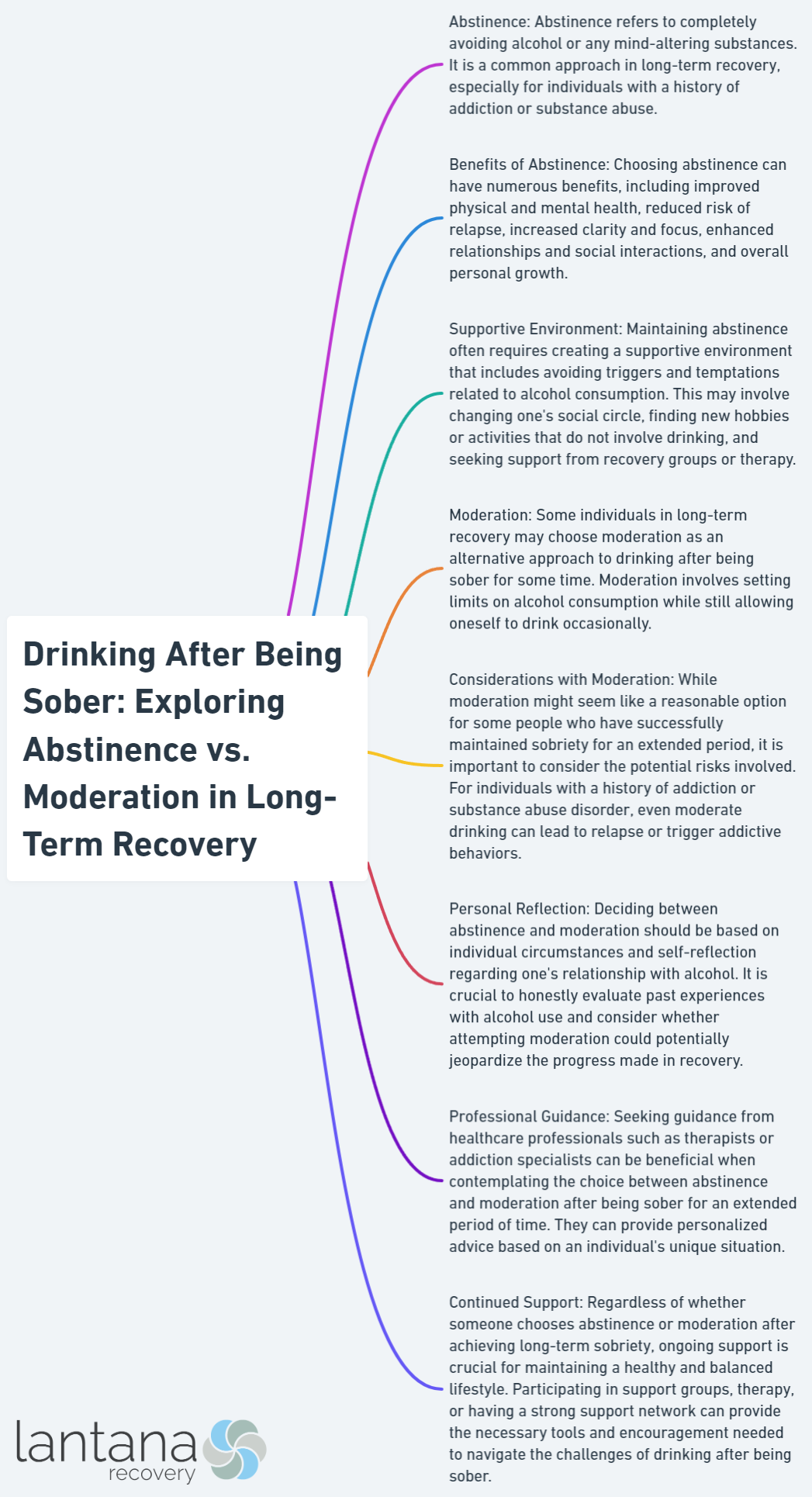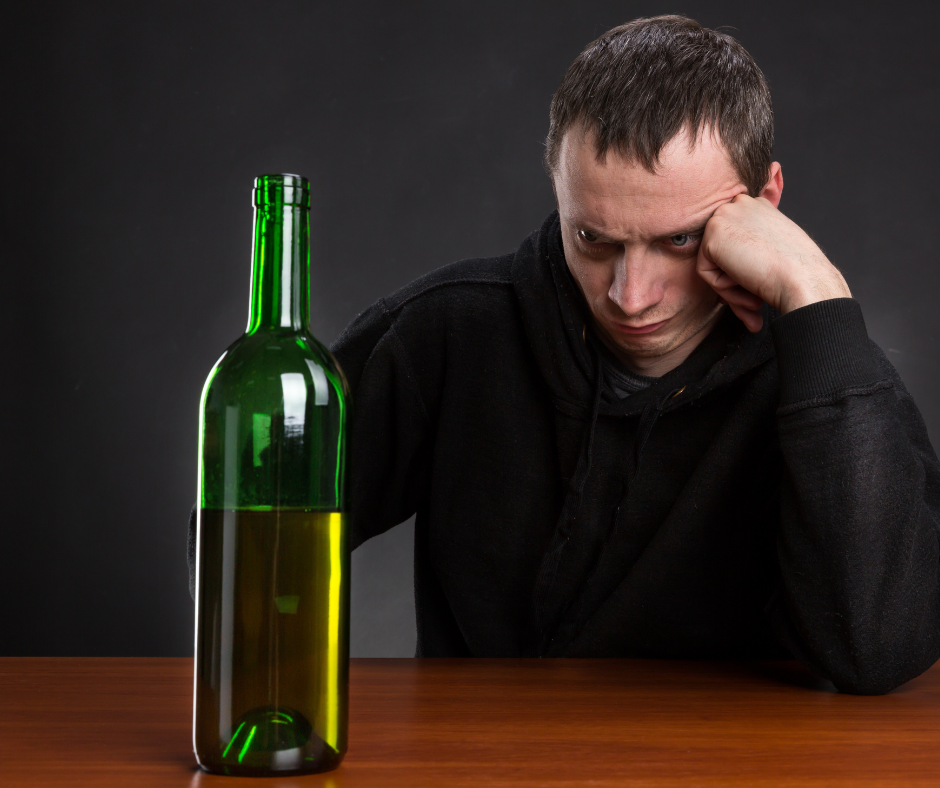Embarking on the journey to sobriety is an incredible accomplishment, but maintaining long-term recovery can be challenging. One of the most significant debates among recovering alcoholics is whether to practice complete abstinence or attempt moderate drinking after being sober. This blog post will delve into the nuances of both approaches, shedding light on the risks, benefits, and strategies to help individuals make informed decisions and maintain a fulfilling sober life.
From exploring the risks of returning to alcohol after sobriety and understanding alcohol use disorder to navigating social situations without alcohol and coping with cravings and triggers, this comprehensive guide will equip you with valuable insights and tools to support your long-term recovery journey, especially when considering drinking after being sober.
Short Summary
- Stay away from alcohol to remain sober and avoid potential risks associated with returning to drinking.
- Develop effective coping strategies for managing emotional triggers and staying committed to sobriety.
- Explore abstinence vs moderation in order to make informed decisions about your recovery journey, reap the benefits of sobriety, and enjoy a fulfilling sober life.
The Risks of Returning to Alcohol After Sobriety

Attempting to drink alcohol after achieving sobriety can be a dangerous path. While some may believe they can return to social drinking without consequences, the reality is that alcohol abuse and alcohol dependence can quickly spiral out of control for those with a history of alcohol use disorder. When recovering alcoholic starts drinking again, they may struggle to limit themselves to just a few drinks, putting their continuous sobriety and well-being at risk.
Abstinence from alcohol has been proven to be the most effective way to maintain sobriety, especially for recovering alcoholics. Seeking professional help from experts at institutions like Lantana can empower individuals to live a happy and sober life, increasing their chances for long-term recovery by offering valuable education and guidance.
But why is it so challenging for some to stick to abstinence and resist the temptation of moderation?

The Slippery Slope
For a recovering alcoholic, having just one drink can be the catalyst for a full-blown relapse. Alcohol alters brain chemistry, reduces inhibitions, and blurs judgment, potentially weakening willpower and leading to alcohol dependence. This slippery slope can make it extremely difficult for individuals to maintain control over their drinking habits, even if they initially intended to practice casual drinking.
Choosing to indulge in de-alcoholized drinks or mocktails may seem like a harmless alternative, but even these seemingly innocent beverages can be triggering for some. Consuming such substitutes can lead to a placebo-drunk-like sensation, ultimately increasing the likelihood of a relapse into alcohol addiction. It’s crucial to be cautious and avoid situations where one might start drinking these substitutes, as they could potentially lead to negative consequences.
It’s crucial for those in recovery to recognize the risks associated with even a single drink as well as why it’s so hard to stay sober and make informed decisions to protect their sobriety.
Emotional Triggers
Emotional triggers, such as:
-
anger
-
sadness
-
loneliness
-
stress
Dealing with intense emotions during recovery can be incredibly overwhelming and difficult to manage. These powerful emotional states can put an individual’s recovery at risk, leading them to turn to alcohol as a coping mechanism. Unfortunately, this can mean that even those who initially intended to practice moderate drinking may find themselves unable to resist the temptation of alcohol during emotionally challenging times, resulting in negative consequences.
Developing effective coping strategies is essential for managing emotional triggers and maintaining sobriety. Techniques such as:
- Exercising
- Resting
- Therapy or counseling
- Meditation or mindfulness
- Spending time with positive people
Can help individuals feel better and more in control. By addressing emotional triggers head-on, recovering alcoholics can reduce the likelihood of relapse and maintain their commitment to a sober life.
Understanding Alcohol Use Disorder

Alcohol use disorder (AUD) is a serious medical condition that can lead to adverse social, occupational, or health consequences and make it difficult to stop or control alcohol use. The distinction between alcohol abuse and alcohol dependence lies in the compulsion and inability to restrain from drinking, even when it causes harm to oneself or others. Abstinence is often the most effective way to manage AUD, as it eliminates the risks associated with alcohol consumption and prevents potential drug abuse.
When an alcoholic starts drinking again after a period of sobriety, they may experience physical symptoms such as:
- sweating
- nausea
- anxiety
- delirium
Alcoholism requires treatment, just like any other medical condition, and understanding the potential consequences of consuming alcohol can help individuals make informed decisions to maintain their sobriety.
The Role of Genetics
Genetics can play a significant role in the development of alcohol use disorder, with variations in many genes increasing the risk. For example, alcohol dehydrogenase 1B (ADH1B) and aldehyde dehydrogenase 2 (ALDH2) are known to be linked to alcohol consumption and alcoholism. Understanding these genetic factors can help individuals make informed decisions to stop drinking alcohol.
Environmental factors, such as family history, peer pressure, and stress, can also contribute to a person’s risk of developing AUD. Being aware of these factors is crucial when considering drinking alcohol again after a period of sobriety. By understanding the complex interplay between genetics and environmental factors, individuals can better navigate the challenges of long-term recovery and make decisions that support their well-being.
Abstinence vs. Moderation: Which Path is Right?

The decision to abstain from alcohol or attempt moderate drinking varies for each individual, with factors such as personal history, genetics, and environmental influences playing a role in determining the best approach. Abstinence is a powerful recovery strategy because it eliminates the risk of relapse, allowing individuals to stay focused on their recovery journey. It also helps break the illusion of control that many alcoholics have, making it easier to quit drinking alcohol for good.
On the other hand, moderation may be more suitable for those without a history of alcohol addiction or dependence, allowing them to enjoy the occasional drink without compromising their health. However, it’s essential to recognize the potential dangers of returning to alcohol after sobriety, such as the slippery slope and emotional triggers discussed earlier, which could be detrimental to one’s health and well-being.
Why Abstinence Works
Abstinence is essential for recovering alcoholics to reach their goals and maintain their sobriety. By eliminating the temptation of alcohol completely, individuals can focus on their recovery journey without the constant struggle of resisting the urge to drink. This unwavering commitment to sobriety can lead to a more fulfilling life than when they were drinking alcohol, even after quitting drinking.
The effectiveness of complete abstinence lies in its ability to:
- Remove the risk of relapse
- Prevent individuals from falling back into old habits
- Stay mindful of stress, boredom, loneliness, and negative emotions
- Enjoy the many benefits of a sober life, such as improved physical and mental health, better relationships, and increased self-confidence.
The Illusion of Control
The illusion of control is the tendency for people to think they have more control over events than they actually do, leading to overestimating their chances of success and attributing outcomes to their behavior. After a period of sobriety, individuals may feel a false sense of control, believing they can drink moderately without any repercussions. This misguided belief can lead to individuals:
- Drinking more than intended
- Experiencing a relapse
- Returning to heavy drinking
- Facing serious health and social consequences.
Recognizing and addressing the illusion of control is crucial for anyone considering moderation after a period of sobriety. By understanding the potential risks and challenges associated with moderate drinking, individuals can make informed decisions about their recovery journey and choose the best path for their well-being.
Navigating Social Situations Without Alcohol

Social situations can be challenging for those in recovery, with the pressure to drink often present in various settings. However, it’s possible to enjoy social events without consuming alcohol and maintain sobriety. By finding alternative activities to do, engaging in meaningful conversations, and focusing on the present moment, individuals can create fulfilling experiences without the need for alcohol.
Developing the skills to navigate social situations without alcohol is essential for long-term recovery, as it offers a sense of understanding and respect for the individual’s commitment to staying sober and avoiding drinking alcohol. With the right support and strategies in place, individuals can confidently participate in social events without compromising their sobriety and can stay sober even without AA, for example.
Finding Support
Supportive friends and family members play a crucial role in addiction recovery, offering understanding and respect for the individual’s decision to remain sober. By surrounding themselves with positive influences, recovering alcoholics can find encouragement and reinforcement in their commitment to sobriety.
Resources such as SAMHSA’s National Helpline, aftercare support groups, and mutual help organizations like Alcoholics Anonymous (AA) and Narcotics Anonymous (NA) can provide invaluable support for those in recovery. These resources offer a secure and encouraging atmosphere to share stories, gain inspiration from others in similar circumstances, and foster a sense of community and responsibility in maintaining long-term sobriety.
Alternative Beverages
Choosing non-alcoholic alternatives can help individuals in recovery avoid the temptation of alcohol while still enjoying social occasions. Cocktails and non-alcoholic spirits are delicious and refreshing options, allowing individuals to participate in social events without compromising their sobriety.
Experimenting with different non-alcoholic beverages can provide a satisfying and enjoyable experience without the risks associated with alcohol consumption. Here are some options to try:
- Ghia Le Spritz
- St. Agrestis Phony Negroni
- Rosemary-and-Ginger Mule
- Frozen Lemonade
- Health-Ade non-alcoholic spirits
By exploring these alternatives, individuals can confidently navigate social situations and maintain their commitment to a sober life.
Coping with Cravings and Triggers

Managing cravings and triggers is a crucial aspect of maintaining sobriety, as they can lead to relapse if not addressed properly. By staying mindful of the following factors, individuals can develop effective coping strategies to resist the urge to drink.
- Stress
- Boredom
- Loneliness
- Negative emotions
Incorporating activities such as exercise, self-care, therapy with Lantana Recovery specialists in Columbia, meditation, and spending time with positive people can help individuals feel better and more in control of their cravings.
By addressing these challenges head-on, those committed to sobriety can enjoy the many benefits of a sober life, such as improved physical and mental health, better relationships, and increased self-confidence.
Mindfulness Techniques
Mindfulness techniques, such as mindfulness meditation, walking meditation, STOP practice, body scans, and breathing exercises like five-finger breathing can help individuals stay mindful and focused during their recovery journey. Cultivating the seven core attitudes of mindfulness – non-judging, patience, beginner’s mind, trust, non-striving, acceptance, and letting go – can further strengthen one’s ability to manage cravings and triggers.
By practicing mindfulness regularly and incorporating the three R’s of mindfulness – Regulation, Resilience, and Realization – individuals can gain greater control over their thoughts, emotions, and actions, ultimately supporting their commitment to sobriety.
Building a Relapse Prevention Plan
A personalized relapse prevention plan is essential for maintaining sobriety, as it helps individuals identify triggers, develop coping strategies, and set achievable goals. By taking proactive steps, such as staying mindful of triggers, using coping strategies, and seeking help when needed, individuals can stay on track with their relapse prevention plan and enjoy a fulfilling sober life.
Creating a relapse prevention plan involves reflecting on past experiences, recognizing potential pitfalls, and developing a personalized approach to managing cravings and triggers. This plan should be regularly reviewed and updated to ensure it remains relevant and effective in supporting long-term recovery and continuous sobriety.
For instance, “relapse rates following alcoholism treatment are high, prompting the exploration of innovative interventions like Alcohol Therapeutic Interactive Voice Response (ATIVR). ATIVR is an automated telephone program designed for post-treatment self-monitoring, skills practice, and personalized feedback. Findings revealed that participants engaged with ATIVR on 59% of scheduled days, continued usage for an average of 84 days, and reported increased self-awareness. Abstinence rates increased significantly during ATIVR, and both self-efficacy and coping improved” (Interactive voice response for relapse prevention, Rose et al., 2012.)
The Benefits of a Sober Life

Living a sober life can bring about many positive changes, including:
- Improved physical health
- Mental well-being
- Stronger relationships
- Increased sense of purpose and fulfillment
By focusing on these positive aspects of an alcohol-free life, individuals can remain committed to their recovery journey and experience a greater sense of overall well-being.
Moreover, seeking professional help and participating in support groups can provide individuals with the necessary tools and resources to manage their addiction and stay on track with their recovery goals. By embracing a sober life, individuals can enjoy a multitude of benefits, including:
- Improved physical health
- Better mental and emotional well-being
- Stronger relationships with family and friends
- Increased productivity and success in work or school
- Financial stability
- A sense of purpose and fulfillment
Leading a sober life allows individuals to live a healthier, more fulfilling existence.
Seeking Professional Help
For those struggling with alcohol addiction or considering returning to drinking after sobriety, seeking professional help is highly recommended. Therapy, support groups, and other resources can provide invaluable assistance in managing addiction and maintaining recovery. Receiving professional guidance can empower individuals to take control of their recovery journey and resist the temptation of drinking alcohol after therapy.
Resources such as Lantana Recovery can offer professional help with alcohol use disorder, the urge to drink, or anything related to alcoholism treatment. By utilizing these resources and maintaining a strong support network, individuals can confidently navigate the challenges of recovery and enjoy a fulfilling, sober life.
Summary
Navigating the journey of long-term recovery from alcohol addiction is a challenging but rewarding process. Understanding the risks of returning to alcohol after sobriety, the complexities of alcohol use disorder, and the benefits of a sober life can empower individuals to make informed decisions about their recovery journey. Whether choosing complete abstinence or attempting moderation, being mindful of potential pitfalls and triggers is crucial to maintaining sobriety.
By seeking professional help, building a strong support network, and developing effective coping strategies, individuals can overcome the challenges of recovery and enjoy a fulfilling, alcohol-free life. Remember, the path to long-term recovery is a personal journey, and finding the right approach for your unique situation is essential for success.
Frequently Asked Questions
Is it okay to drink after being sober?
For the majority of people, drinking alcohol after being sober can lead to relapse. Therefore, it is not recommended to have even one drink while in recovery.
What is it called when you drink again after being sober?
Relapsing is when an individual returns to drinking or using drugs after a period of sobriety, which differs from a lapse where they briefly drink but then quickly stop again.
A lapse is a brief return to drinking or using drugs, but the individual quickly stops again. Relapsing is when the individual returns to drinking or using drugs after a period of sobriety.
How can I manage emotional triggers during recovery?
Manage emotional triggers during recovery by exercising, resting, seeking therapy or counseling, meditating, and spending time with positive people – these activities can help you feel more in control and support.
Taking the time to focus on yourself and your mental health is essential for successful recovery. Exercise can help to reduce stress and anxiety, while rest can help to restore energy and focus. Seeking therapy or counseling can provide a safe space to process emotions and gain insight into your triggers.
What are the benefits of living a sober life?
Living a sober life can provide tremendous benefits including improved physical and mental health, better relationships, increased self-confidence, and a greater sense of purpose and fulfillment. Embrace sobriety and unlock your true potential!
How can I navigate social situations without alcohol?
Start socializing without alcohol by engaging in alternative activities, and conversations and focusing on the present moment. Non-alcoholic drinks are a great way to join in the festivities without compromising your well-being.









